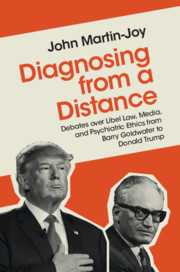'Psychiatrists are often asked in casual conversation for a diagnosis without a personal examination. Using many primary sources rarely discussed in previous surveys, John Martin-Joy provides a detailed and far-reaching analysis of the implications of such a scenario. Fascinating, thought-provoking, and highly recommended.'
Thomas G. Gutheil - Harvard University
'With compelling prose, page-turning narrative, and sophisticated analysis, John Martin-Joy uses a little-known, but important, libel case to discuss an issue of great political significance: the ethical, professional, social, and legal ramifications of psychiatrists commenting publicly on the mental health of public figures.'
Samantha Barbas - University of Buffalo
'What do Adolf Hitler, Barry Goldwater, Saddam Hussein, and Donald Trump have in common? John Martin-Joy shows how psychiatrists and psychoanalysts had strong views about these men’s mental health and very different opinions about whether they could share these views. Part media history and part ethical study, this book may change how you think about professionalism, politics, and the First Amendment.'
James T. Hamilton - Hearst Professor of Communication, Chair of the Department of Communication, and Director of the Journalism Program, Stanford University
'With extraordinary historical detail and a remarkable sensitivity to rational, moral disagreement, this volume is now the book of record for understanding the ethical implications of the Goldwater Rule. Policymakers, clinicians, scholars, and concerned citizens interested in the nexus of politics and psychiatry - especially during our current, perilous moment - must read this book.'
Dominic A. Sisti - Director, The Scattergood Program for Applied Ethics of Behavioral Health Care, University of Pennsylvania
'John Martin-Joy is a meticulous researcher and writer, making his book a pleasure to read. Mixing the disciplines of law, psychiatry, and history, the book describes the impact of the ‘Goldwater Rule’ with the detail and analytic precision that no scholar has provided before. This book is sure to be regarded as a classic in the years ahead.'
Lawrence J. Friedman - Professor of History Emeritus, Harvard University and Indiana University
‘… historically detailed and well referenced … legally and philosophically sophisticated …’
Allen R. Dyer
Source: Journal of the American Psychoanalytic Association
‘Diagnosing from a Distance is a wonderful read that CL psychiatrists could be easily swept up in. The book speaks to the intellectually curious detective that resides inside each of us.’
Flannery Merideth
Source: Journal of the Academy of Consultation-Liaison Psychiatry
‘Martin-Joy’s study rightly focuses on the dialectics animating the recent of history of the helping professions…This book focuses on how psychiatric knowledge travels through mass media and the legal system and how these encounters transformed psychiatric ethics.’
Michael Pettit
Source: American Historical Review





